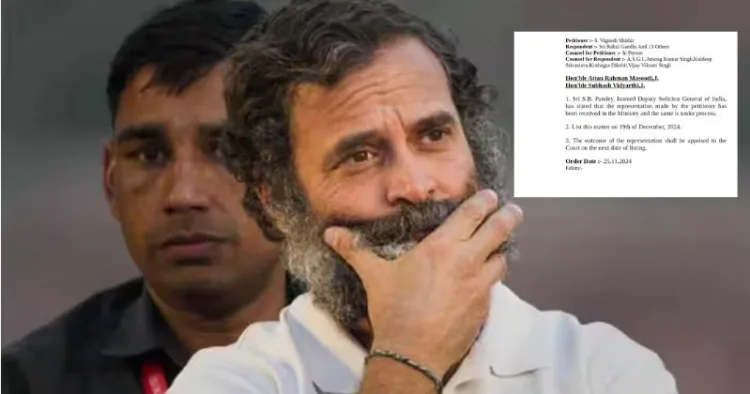The issue of Congress leader Rahul Gandhi’s alleged dual citizenship has sparked a major political controversy in India, with claims that he holds UK citizenship. The matter is currently under investigation, following a public interest litigation (PIL) filed in the Allahabad High Court, which has sought clarification from the Union Home Ministry
The Petition and Allegations
The controversy began when an activist S. Vignesh Shishir from Karnataka filed a Public Interest Litigation (PIL) in the Allahabad High Court. The petition alleges that Rahul Gandhi holds citizenship in the United Kingdom, which, if true, would disqualify him from contesting elections or holding public office under Indian law. Shishir contends that Gandhi’s dual citizenship violates the Citizenship Act, 1955, as well as provisions in the Bharatiya Nyaya Sanhita and the Passport Act.
Shishir’s petition demands the cancellation of Gandhi’s electoral certificate and an inquiry by the Central Bureau of Investigation (CBI) into the matter. He has also sought directives for the Chief Election Commissioner and the Chief Electoral Officer of Uttar Pradesh to take necessary action.
Government’s Response and Court Directions
In response to the petition, the Ministry of Home Affairs (MHA) informed the court that the matter is under investigation. The Deputy Solicitor General stated that the MHA has received the representation and is processing it. The court has scheduled the next hearing for December 19, 2024, and instructed the additional solicitor general to present the Centre’s findings.
While speaking to Organiser, Shishir claims to have received evidence from the UK government that includes Rahul Gandhi’s name in their citizenship records. He argues that under Indian law, acquiring foreign citizenship automatically results in the cancellation of Indian citizenship.
Parallel Case in Delhi High Court
The controversy is not limited to the Allahabad High Court. A similar case is being heard in the Delhi High Court, where BJP leader Subramanian Swamy has filed a petition seeking the cancellation of Gandhi’s Indian citizenship. Swamy argues that Gandhi has declared himself a British citizen in documents related to a UK-based company.
During the Delhi HC hearing, Swamy asserted that his plea is distinct from Shishir’s, as it focuses on proving Gandhi’s British citizenship rather than initiating criminal prosecution. However, Shishir’s legal team argued that Swamy’s case has led to duplication and parallel proceedings, as evidence has already been submitted to the CBI in the Allahabad HC case.
The Delhi HC bench, comprising Chief Justice Manmohan and Justice Tushar Rao Gedela, noted that it aims to avoid conflicting orders and acknowledged that the case in Allahabad HC is at an advanced stage.
Indian Law and Dual Citizenship
India does not allow dual citizenship. Under the Citizenship Act, 1955, an individual automatically loses Indian citizenship upon acquiring foreign nationality. This restriction also applies to those seeking to contest elections or hold public office in India.
For the BJP, the issue is framed as one of legal and ethical accountability. “The rule of law must prevail. If the allegations are true, it is a serious matter,” said a senior BJP leader.
The controversy over Wayanad MP Rahul Gandhi’s citizenship has been brewing for years. Previous allegations have surfaced during elections, including claims that Gandhi declared himself a British citizen while filing documents for a now-defunct UK-based company.
The Allahabad HC has directed the Centre to present its findings on December 19, while the Delhi HC will decide on the admissibility of Swamy’s plea in the coming weeks. The MHA’s eventual clarification will play a crucial role in determining the validity of the allegations and the political future of Rahul Gandhi.



















Comments